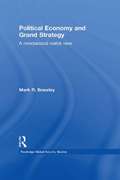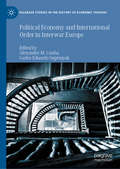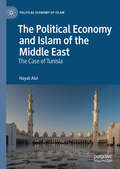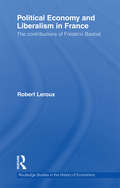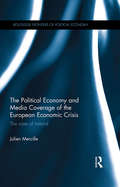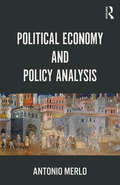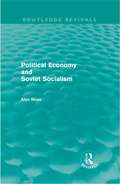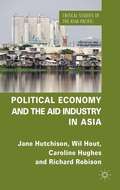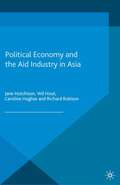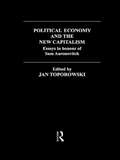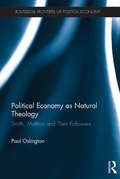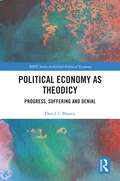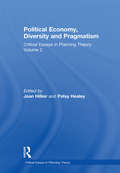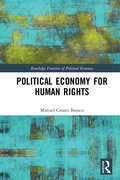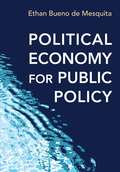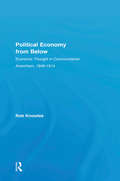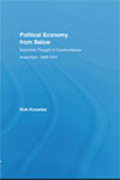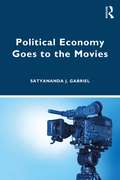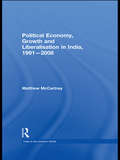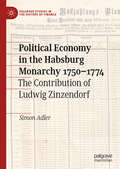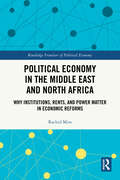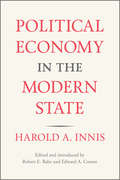- Table View
- List View
Political Economy and Grand Strategy: A Neoclassical Realist View (Routledge Global Security Studies #Vol. 13)
by Mark R. BrawleyThis book examines traditional balance of power theory from a political-economic perspective, using historical examples, to draw out distinctions between the liberal and realist approach and how this affects grand strategy. The realist view of the balance of power theory includes implicit assumptions that economic assets can be turned quickly into power, and that states always respond to threats quickly and only with a view to the 'short-run'. These assumptions drive many of the expectations generated from traditional balance-of-power theory, discouraging realists from looking at domestic sources of power, which in turn undermined their ability to frame strategic decisions properly. By thinking about how power must be managed over time, however, we can model the choices policy-makers confront when determining expenditures on defense, while keeping an eye on the impact of those costs on the economy. By emphasizing the role of the state, identifying different causal patterns in domestic politics, and demonstrating the importance of systemic competition, this book aims to establish why a neo-classical realist approach is not only different from a liberal approach, but also superior when addressing questions on grand strategy. This book will be of much interest to students of security studies, international political economy, grand strategy and IR theory in general. Mark R. Brawley is Professor of Political Science at McGill University, Montreal, Canada. He is author of several books on International Relations, specialising in the connections between political economic issues and security.
Political Economy and Industrialism: Banks in Saint-Simonian Economic Thought (Routledge Studies In The History Of Economics Ser. #110)
by Gilles JacoudThe French philosopher and economist Saint-Simon (1760–1825) propounded a new political, economic and social order in which the quest for economic efficiency and social justice led to putting the workers at the forefront. On his death, his disciples worked to preserve his thought and developed it in numerous writings. This book explains why the Saint-Simonians could not be content with the existing economic and social order and how they planned to organise society and the role banks were to play in it. It contains a selection of old texts, written by the main Saint-Simonian thinkers, published in the press in French between 1826 and 1831, which show the Saint-Simonian conception of the organisation of society and the place allotted to banks. It is an indispensable reference work in understanding a current of thought which greatly contributed to the industrial expansion of the nineteenth century. This book will be of interest to postgraduate students, economists, historians and philosophers interested in the history of economic thought.
Political Economy and International Order in Interwar Europe (Palgrave Studies in the History of Economic Thought)
by Alexandre M. Cunha Carlos Eduardo SuprinyakStandard histories of European integration emphasize the immediate aftermath of World War II as the moment when the seeds of the European Union were first sown. However, the interwar years witnessed a flurry of concern with the reconstruction of the world order, generating arguments that cut across the different social sciences, then plunged in a period of disciplinary soul-searching and feverish activism. Economics was no exception: several of the most prominent interwar economists, such as F. A. Hayek, Jan Tinbergen, Lionel Robbins, François Perroux, J. M. Keynes and Robert Triffin, contributed directly to larger public discussions on peace, order and stability. This edited volume combines these different strands of historical narrative into a unified framework, showing how political economy was integral to the interwar literature on international relations and, conversely, how economists were eager to incorporate international politics into their own concerns. The book brings together a group of scholars with varied disciplinary backgrounds, whose combined perspectives allow us to explore three analytical layers. The first part studies how different forms of economic knowledge, from economic programming to international finance, were used in the quest for a stable European order. The second part focuses on the existence of conflicting expectations about the role of social scientific knowledge, either as a source of technical solutions or as an input for enlightened public discussion. The third part illustrates how certain ideas and beliefs found concrete expression in specific institutional settings, which amplified their political leverage. The three parts are enclosed by an introductory essay, laying out the broad topics explored in the volume, and a substantial postscript tying all the historical threads together.
The Political Economy and Islam of the Middle East: The Case of Tunisia (Political Economy of Islam)
by Hayat AlviThis book analyzes the political economy of the MENA region with a focus on pre-revolutionary political and economic conditions, the 2011 revolution itself, and post-revolutionary political processes in Tunisia. The author places particular emphasis on the political role of women, Islam, and democracy after the revolution, and argues that post-Revolution Tunisia serves as an ideal model for the MENA region to follow. This volume will interest scholars, students, researchers, and everyone who is interested in the politics of MENA and political economy.
Political Economy and Liberalism in France: The Contributions of Frédéric Bastiat (Routledge Studies In The History Of Economics Ser. #126)
by Robert LerouxThe purpose of this book is to provide a comprehensive analysis of the work of Frédéric Bastiat (1801-1850), one of the towering intellectual figures of nineteenth century France. More than anyone else of his time, Bastiat personified the struggle of liberalism and science against socialism and utopia. Between 1844 in 1850, his campaign for the idea of liberty and his commitment to the discipline of political economy made him one of the most vigorous champions of economic liberalism in France. Bastiat put forth one of the most ambitious interpretations of the liberalism of his time, one that entailed both a critique of primitive socialism and a concern to provide political economy with a theoretical foundation. His thinking is far more sophisticated than would appear at first glance. Nor can it be confined, as so many commentators would have us believe, to its strictly economic dimension. The themes that Bastiat addressed – free trade, competition, labour, among others – certainly helped to reduce it to this dimension. Yet he did not limit himself to these issues, even if he dealt with them at length. He also paid close attention to the political, moral, social and religious dimensions. Coming, as Bastiat’s writing did, at a decisive moment in the history of French liberalism, the very existence of his work explodes the long-standing received idea to the effect that liberalism, and in particular economic liberalism, is the exclusive domain of Anglo-Saxon countries. Bastiat’s work thus offers a solid rebuttal to Hayek, who proclaimed "the total absence of a liberal tradition in France." This book should be of interest to students and researchers of many strands of economics, as well as those looking at French liberalism and the history of social science more generally.
The Political Economy and Media Coverage of the European Economic Crisis: The case of Ireland (Routledge Frontiers of Political Economy)
by Julien MercilleThe European economic crisis has been ongoing since 2008 and while austerity has spread over the continent, it has failed to revive economies. The media have played an important ideological role in presenting the policies of economic and political elites in a favourable light, even if the latter’s aim has been to shift the burden of adjustment onto citizens. This book explains how and why, using a critical political economic perspective and focusing on the case of Ireland. Throughout, Ireland is compared with contemporary and historical examples to contextualise the arguments made. The book covers the housing bubble that led to the crash, the rescue of financial institutions by the state, the role of the European institutions and the International Monetary Fund, austerity, and the possibility of leaving the eurozone for Europe’s peripheral countries. Through a systematic analysis of Ireland’s main newspapers, it is argued that the media reflect elite views and interests and downplay alternative policies that could lead to more progressive responses to the crisis.
Political Economy and Policy Analysis
by Antonio MerloMost of economics takes politics for granted. Through some (often implausible) assumptions, it seeks to explain away political structures by characterizing them as stable and predictable or as inconsequential in understanding what goes on in an economy. Such attempts are misguided, and this book shows how governments and political institutions are composed of people who respond to incentives and whose behavior and choices can be studied through the lens of economics. This book aims to bridge the gap between economics and politics, and in doing so hopes to instill in the reader a deeper appreciation for social scientific thinking. Opening with a refresher on microeconomics and an introduction to the toolkit of political economy, it ensures that the necessary building blocks are in place before building up from the level of the individual and the firm to show how a political–economic equilibrium can be achieved. The text explores how to separate primitives—the external parts of a model that we cannot affect—from outcomes—the internal parts of a model that we can. Moreover, it demonstrates that economic and political issues alike can be studied within the same general framework of analysis. Political Economy and Policy Analysis offers readers the chance to gain a more sophisticated understanding of political processes, economic processes, and the interplay among them. Adopting an applied microeconomics approach, it will be ideal for upper-level undergraduate or postgraduate courses on political economy, public choice, or policy analysis.
Political Economy and Soviet Socialism (Routledge Revivals)
by Alec NoveFirst published in 1979, Political Economy and Soviet Socialism is an integrated selection of papers written over the past 12 years of Russian history, which offers a unique insight into some important and controversial issues. Professor Nove discusses the ideas of some of the leaders of the Russian revolution (Lenin, Trotsky and Bukharin), the political economy of socialism and the problems of the contemporary USSR. The author addresses the role of traditional Russian ideas in shaping the Soviet Union’s social structure and the conceptual problems involved in defining its ruling stratum - whether or not it is a class. He also considers the criteria by which it is reasonable to judge Soviet reality, the performance and prospects of agriculture in communist-ruled Europe, the ability of the Eastern bloc to tackle problems of inflation and the obstacles to economic reform. Looking at the important and original developments of economic thought in the USSR and Eastern Europe, Professor Nove dissects the ideas of the ‘new leftists’ concerning the role of market forces under a feasible socialism. These papers offer essential reading for students of politics, economics and comparative social structure.
Political Economy and the Aid Industry in Asia (Critical Studies of the Asia-Pacific)
by Caroline Hughes Jane Hutchison Wil Hout Richard RobisonAdopting a distinctive structural political economy approach, this book uniquely explains the blind spots of alternative political economy approaches to international aid, and presents an original framework for evaluating likely reformers' strength of commitment and potential alliances with donors.
Political Economy and the Aid Industry in Asia (Critical Studies of the Asia-Pacific)
by J. Hutchison W. Hout C. Hughes R. RobisonAdopting a distinctive structural political economy approach, this book uniquely explains the blind spots of alternative political economy approaches to international aid, and presents an original framework for evaluating likely reformers' strength of commitment and potential alliances with donors.
Political Economy and the New Capitalism: Essays in Honour of Sam Aaronovitch (Routledge Frontiers of Political Economy #Vol. 26)
by Jan ToporowskiPolitical Economy and the New Capitalism examines the relevance of Sam Aaronovitch's pioneering empirical studies of British capitalism in the light of modern developments. A wide range of problems are reviewed from industrial concentration today to the co-ordination of economic policies in Europe. Aaronovitch's work on the role of finance in the British economy is the subject sustained reflection. Individual chapters examine orthodox and left-wing criticisms of finance, exchange rate instability, and employment, growth and regions in the context of European Union. This work concludes with a bibliography of the published writings of Sam Aaronovitch and collects the reflections of some of the most distinguished thinkers in economics today including: Meghnad Desai, G.C. Harcourt, Pat Devine, Egon Matzner, Malcolm Sawyer, Sir Alan Budd, Jan Toporowski, Philip Arestis, Eleni Paliginis, Victoria Chick and Ben Fine.
Political Economy as Natural Theology: Smith, Malthus and Their Followers (Routledge Frontiers of Political Economy)
by Paul OslingtonSince the early 20th century, economics has been the dominant discourse in English-speaking countries, displacing Christian theology from its previous position of authority. This path-breaking book is a major contribution to the interdisciplinary dialogue between economics and religion. Oslington tells the story of natural theology shaping political economy in the late 18th and early 19th centuries, emphasising continuing significance of theological issues for the discipline of economics. Early political economists such as Adam Smith, Josiah Tucker, Edmund Burke, William Paley, TR Malthus, Richard Whately, JB Sumner, Thomas Chalmers and William Whewell, extended the British scientific natural theology tradition of Francis Bacon, Robert Boyle and Isaac Newton to the social world. This extension nourished and shaped political economy as a discipline, influencing its theoretical framework, but perhaps more importantly helping legitimate political economy in the British universities and public policy circles. Educating the public in the principles of political economy had a central place in this religiously driven program. Natural theology also created tensions (especially reconciling economic suffering with divine goodness and power) that eventually contributed to its demise and the separation of economics from theology in mid-19th-century Britain. This volume highlights aspects of the story that are neglected in standard histories of economics, histories of science and contemporary theology. Political Economy as Natural Theology is essential reading for all concerned with the origins of economics, the meaning and purpose of economic activity and the role of religion in contemporary policy debates.
Political Economy as Theodicy: Progress, Suffering and Denial (ISSN)
by David L. BlaneyPolitical Economy as Theodicy: Progress, Suffering and Denial proposes that political economics operates within a theological symbolic order that dictates modern sociopolitical and economic life as a whole.This book revisits the work of key figures in the history of political economy and economic thought – primarily Adam Smith, Bernard Mandeville, David Hume, Thomas Malthus, W. Stanley Jevons, Alfred Marshall and John Bates Clark. Theodicy is a constitutive element of an international political economy (IPE) that often disavows moral evil, while it conversely redefines such evil as an actual good within economic life. Beginning with the Enlightenment thinkers and continuing through to the modern neoclasscial economists, this book traces the initial emergence of a natural theological basis for political economic thinking and concludes with a discussion of its application in modern IPE. Relying upon a postcolonial framework, the author seeks to provincialize economics, creating space for alternative modes of being and doing.This book will appeal to scholars and advanced students of IPE, political theology, international relations and postcolonial studies.
Political Economy, Diversity and Pragmatism: Critical Essays in Planning Theory: Volume 2 (Critical Essays in Planning Theory)
by Patsy HealeyPlanning Theory has a history of common debates about ideas and practices and is rooted in a critical concern for the 'improvement' of human and environmental well-being, particularly as pursued through interventions which seek to shape environmental conditions and place qualities. The second volume in this series covers in detail critical political economy, the turn to diversity and critical pragmatism. It provides an authoritative collection, in an accessible form, of the most important and influential articles and papers along with a detailed introduction by the editors. It offers a unique reference resource for planning scholars, upper-level undergraduate and post-graduate students.
Political Economy for Human Rights (Routledge Frontiers of Political Economy)
by Manuel Couret BrancoOver time there has been a miscommunication between mainstream economics and human rights that has paved the way to a justificatory ideology that validates the submission of human rights to the logic of market capitalism. This book shows how the discourse of mainstream economics is intrinsically opposed to the strengthening of human rights and outlines the principles upon which a human rights-based political economy can be built. Considering a variety of recognized human rights, such as the right to water and sanitation, the right to social security, the right to work, cultural freedom and democracy, this book describes how mainstream economics theory conflicts with these rights and explores alternative modes of thinking that incorporate human rights concerns into economics. Moreover, the book also reflects on the teaching of political economy for human rights. It sets out that a political economy favourable to human rights must be pluralist, interdisciplinary, participatory, de-commodified, non-utilitarian and non-consequentialist. The author proposes that it must not only assume the performative character of economics but also, and especially, its transformative purpose. Political Economy for Human Rights will offer students, academics, activists and policy makers useful tools to understand some of the main contradictions of contemporary societies and new paths leading to a more just and fraternal world. It will also be of great interest to the general public concerned with human rights and economic issues.
Political Economy for Public Policy
by Ethan Bueno de Mesquita<p>This textbook uses modern political economy to introduce students of political science, government, economics, and public policy to the politics of the policymaking process. The book's distinct political economy approach has two virtues. By developing general principles for thinking about policymaking, it can be applied across a range of issue areas. It also unifies the policy curriculum, offering coherence to standard methods for teaching economics and statistics, and drawing connections between fields. <p>The book begins by exploring the normative foundations of policymaking―political theory, social choice theory, and the Paretian and utilitarian underpinnings of policy analysis. It then introduces game theoretic models of social dilemmas―externalities, coordination problems, and commitment problems―that create opportunities for policy to improve social welfare. Finally, it shows how the political process creates technological and incentive constraints on government that shape policy outcomes. Throughout, concepts and models are illustrated and reinforced with discussions of empirical evidence and case studies. <p>This textbook is essential for all students of public policy and for anyone interested in the most current methods influencing policymaking today. <p> <li>Comprehensive approach to politics and policy suitable for advanced undergraduates and graduate students <li>Models unify policy curriculum through methodological coherence <li>Exercises at the end of every chapter <li>Self-contained appendices cover necessary game theory <li>Extensive discussion of cases and applications</li> </p>
Political Economy from Below: Economic Thought in Communitarian Anarchism, 1840-1914 (New Political Economy Ser.)
by Rob KnowlesCommunitarian anarchism is a generic form of socialism that denies the need for a state or any other authority over the individual from above, and which requires absolute belief that the individual cannot exist outside of a community of others. This book suggests that the communitarian anarchists of the nineteenth century developed and articulated a distinct tradition of economic thought. The period of this study begins with the first major writing of the French communitarian anarchist, Pierre-Joseph Proudhon, in 1840 and ends with the temporary burial of anarchist theorizing at the beginning of the First World War in 1914. However, he tradition of communitarian anarchist economic thought did not end in 1914. The economic thought explored in this book provides a fresh perception of the fragmentation evident in many societies today, especially where there is a substantial "informal economy."
Political Economy from Below: Economic Thought in Communitarian Anarchism, 1840-1914 (New Political Economy)
by Rob KnowlesCommunitarian anarchism is a generic form of socialism that denies the need for a state or any other authority over the individual from above, and which requires absolute belief that the individual cannot exist outside of a community of others. This book suggests that the communitarian anarchists of the nineteenth century developed and articulated a distinct tradition of economic thought. The period of this study begins with the first major writing of the French communitarian anarchist, Pierre-Joseph Proudhon, in 1840 and ends with the temporary burial of anarchist theorizing at the beginning of the First World War in 1914. However, he tradition of communitarian anarchist economic thought did not end in 1914. The economic thought explored in this book provides a fresh perception of the fragmentation evident in many societies today, especially where there is a substantial "informal economy."
Political Economy Goes to the Movies
by Satyananda J. GabrielPolitical Economy Goes to the Movies provides an introduction to political economy using a wide range of popular films and documentaries as the objects of analysis. The work helps readers to understand and analyze the economic and related political, cultural, and ecological relationships depicted in selected films. This is achieved through the lens of past and present economic theories and in the context of debates over the dynamic influence of economics on individual life chances. Film may have more to teach us about the real world than the abstractions of certain economic theories. A world of income inequality, child labor in mills and mines, local rebellions against land seizures, and wars triggered by economic conflicts provide the context for many films mirroring real world events. Some films depict the interacting and intersecting political, economic, cultural, and ecological contexts within and between variant economic relationships, whereas other films show “catastrophes” such as economic depressions, disruptive social transitions, violent revolutions, and existential environmental degradation – a world in disequilibrium. Films allow us to see a panoply of human social relationships and related problems, even to explore cataclysmic moments in our species life, but not to necessarily see the why of these relationships and problems. Simultaneously, mainstream economics has severe constraints on what can be analyzed. Film exposes this weakness of the mainstream model. Twelve Years a Slave, Trumbo, The Big Short and others are analyzed for their realism by referencing documented historical social events, and behavioral economics provides further data for analyzing the realism of social interaction within the films. Exploring events and contexts absent from the typical economics text or the basic level economics classes, this work is essential reading for students and scholars of political economy in both economics and politics departments, as well as those of pluralist economics and Marxist economics.
Political Economy, Growth and Liberalisation in India, 1991-2008 (India in the Modern World)
by Matthew McCartneyThe phenomenal growth and liberalisation of the Indian economy has been the subject of extensive scholarly documentation and competing interpretations. This book examines the key period of liberalisation in India from 1991 to 2008. It analyses the relationship between growth and liberalisation and, in particular, the recent ‘miracle growth rate’ and considers its sustainability in the current Indian economic environment. The book explores and re-evaluates the historical experience of planning in India between 1950 and 1980 as an alternative model of state-led economic development, discusses how far current rapid growth is the result of liberalisation, and how strong the case is for continued liberalisation today. The book is a significant contribution to the growing debate on economic growth and liberalisation, and the broader subject of economic development in India and other developing countries. It will appeal to students, researchers, lecturers and all those interested in South Asia in general and, India, in particular. It is also an essential resource for the study of international political economy and development economics.
Political Economy in Haiti: The Drama of Survival
by Simon M. FassThis important study introduces the conceptual premise that families, like firms, analyze their circumstances, make decisions, and pursue courses of action on the basis of what they perceive to be the most efficient methods for producing and reproducing survival. Combining this premise with an extraordinary assemblage of facts gleaned over the period of a decade from the streets, markets and homes of Port-au-Prince, the author weaves a tapestry of despair and hope which only an unusual degree of intimacy with the details of everyday life in the city could provide. The result is a considerable deepening of understanding about the politics and economics by which family members earn their livelihoods, distribute resources within and between households, produce life and labor from food and water, provide shelter and schooling for themselves, and borrow money to finance these and other activities.These different dimensions of daily existence form a web of interdependency in which change in any one dimension causes change in all the others. As Professor Pass's work demonstrates, research and development assistance practices of public and private organizations, in such areas as employment, health, housing, education and credit are often irrelevant. This is because they are necessarily guided by prevailing concepts and theories with respect to the circumstances of the urban poor, which sometimes do the poor considerable disservice.With the additional insight provided by a decade of participation in the design of policies, programs and projects serving as a tempering influence, the author does not leap to easy criticism of prevailing views and practices. He notes that ideas and interventions change in response to new understanding, sometimes in ways that the producers of such understanding could never have imagined. The problem is that change is painfully slow, and in desperately poor countries like Haiti, waiting for change exacts an almost intolerable price from the poor.This book is a provocative yet highly original contribution which will require serious attention from scholars and practitioners of development. Appearing as it does soon after the great seaward exodus of Haitians and urban unrest culminating in the flight of the Duvalier family, this timely volume will provide illumination for those seeking to understand the circumstances that press people to risk all in the name of survival.
Political Economy in the Evolution of China's Urban–Rural Economic Relations (China Perspectives)
by Fan GaoThis book investigates the trajectory and evolutionary mechanisms of China’s urban–rural economic relationships, seeking to explore how a developing socialist country can attain sustainable development and common prosperity. Grounded in a deep literature review and a practical analysis of real-world conditions in China, the study challenges the dual economy theory of development economics that has prevailed in discussion of Chinese urban–rural economic relationships and puts forward an alternative analytical framework based on political economy. Considering the role political and social factors have played in China’s economic development since 1949, the author divides the evolution of China’s urban–rural economic relationship into two stages. In the first stage the relationship is seen to be a “separated” one, a situation that led to several repercussions; but the reform and opening-up of the late 1970s marked a turning point leading to a second stage featured by “imbalanced integration”. Through empirical research, the book analyses the momentum, economic effects, and problems of this turn, thereby envisaging an upgraded stage marked out by “collaborative integration”, integral to further economic development and a more prosperous society in all respects. The title will appeal to scholars and student studying political economy, urban–rural economic relationships, development economics, and the Chinese economy.
Political Economy in the Habsburg Monarchy 1750–1774: The Contribution of Ludwig Zinzendorf (Palgrave Studies in the History of Finance)
by Simon AdlerPolitical Economy in the Habsburg Monarchy is an important study of the contribution of Austrian Enlightenment economist Ludwig Zinzendorf to the political economy of the Habsburg monarchy in the mid eighteenth century. Simon Adler provides the first comprehensive analysis, and first ever study in English, of the development of Zinzendorf’s thinking on the economy, commerce and, above all, state finances. Political Economy in the Habsburg Monarchy shows the extent to which Zinzendorf’s insights were part of the wider European movement dedicated to understanding political economy as an independent and important activity. It establishes Zinzendorf, a protégé of the State Chancellor Wenzel Anton Kaunitz, as a pivotal figure in the development of Austrian economic and financial policies during the 1750s and 1760s and explains how he challenged cameralism using the most advanced European economic ideas, notably from French writers around Vincent de Gournay. This book is based upon wide-ranging research of primary sources and comprehensive coverage of secondary literature and adds significantly to the ongoing historiographical turn towards political economy in the eighteenth century.
Political Economy in the Middle East and North Africa: Why Institutions, Rents, and Power Matter in Economic Reforms (Routledge Frontiers of Political Economy)
by Rachid MiraMany countries in the Middle East and North Africa continue to face major economic and political challenges, including volatile economic growth, low economic diversification, high unemployment levels, and, in some cases, pervasive authoritarian regimes. These economic and political challenges are interdependent, and reform is needed in both spheres if structural, long-lasting change is going to be achieved.This book combines the World Bank’s concept of “good governance” with other analytical tools of political economy – including rent-seeking theory, political settlements approach, the resource curse, and Dutch Disease – to explore how government institutions in the region affect economic reforms and vice versa. The book also examines the role of institutions and performance of governance on rent distribution, evaluating how governments manage their, sometimes-abundant natural resources. In some “rentier states,” governments are clearly utilizing these resources for their own political ends even at the cost of negatively impacting economic growth, job creation, and social service provision. Economic growth is also constrained by low flows of both private and public investment toward productive sectors that need it. The book analyzes the differences between countries in the Middle East and North Africa in their economic and political structures to show how sustainable economic growth and a level of political democratization can be achieved through enhancing governance institutions.This book will be invaluable reading for researchers on the political economy of the Middle East and institutional economics.
Political Economy in the Modern State
by Harold Innis Robert Babe Edward ComorPolitical Economy in the Modern State is Harold Innis’s transitional and, in some respects, his most transformative book. Completed in 1946, it is a collection of fifteen chapters plus a remarkable Preface selected and crafted to address four main themes: the problem of power and peace in the post-War era; the ascent of specialized and mechanized forms of knowledge involving, most particularly, the media, the state, and the academy; the crisis facing civilization and, more generally, the modern penchant for unreflexive short-term thinking in the face of mounting contradictions; and Innis’s growing focus on what would be called media bias.In this new edition, editors Robert E. Babe and Edward A. Comor provide not only a general introduction to Innis’s largely forgotten book but also dedicated introductions to each of its fifteen chapters and a comprehensive index. Together, Babe and Comor demonstrate how Innis’s volume reflects a shift in Innis’s focus, away from analytical relativism towards, instead, a reflexive search for objective truths.
